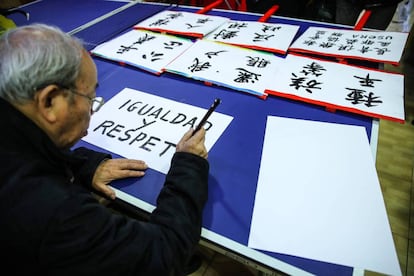Madrid’s Chinese residents march against crippling bank account freeze
In the largest turnout for this community, around a thousand people protested what they see as racist policies that target them unfairly as part of lenders’ crackdown on money laundering


Around a thousand people of Chinese origin, according to police estimates, marched outside the BBVA Foundation in Madrid on Friday to protest a widespread freeze on their bank accounts.
Suddenly I am being treated like a criminal who launders money
Estrella Zheng, 75
The bank says it is complying with anti-money laundering legislation and denies any discrimination based on race, as the demonstrators claim.
Protesters waved signs with messages in Spanish and Chinese. “Surviving is not a crime. Stop racism!” read one. “I need to pay rent, food, school, I want my money,” read another. “I haven’t been able to take out money for months,” said a third.
The march was organized by a federation of 74 Chinese associations in Spain. Protesters blocked off all three lanes on one side of Paseo de Recoletos, outside the BBVA Foundation. The building was selected because of its central location, as the BBVA headquarters are currently located in the outskirts.
This marks the first major protest in Madrid by Chinese nationals. Associations say that the community has suffered problems in silence in the past, such as a wave of robberies at Chinese-run establishments. But this time, the damage and the anger are much greater.

“We are a very calm people. For us to go out on the streets, it’s got to be a really big deal,” said Beini Qian, a 32-year-old volunteer who helped prepare the march. Members of the Chinese Senior Center in the neighborhood of Usera helped by handpainting the signs used in the protest.
The Chinese federation believes as many as 5,000 people could be affected. The banks began blocking accounts months ago, but the wave of new freezes last week, during the Chinese New Year, was especially painful to the community.
The demonstrators included students, business owners and employees who have been unable to access the money in their accounts for months. Huang Dufang, 33, who works in a cafeteria, cried as she told her story: she spent the saddest New Year ever, she said, cut off from her savings of just over €1,000 and with very little cash to tide her over. “I wanted to make a special meal with seafood, but they blocked my account.”
Estrella Zheng, a 75-year-old retiree, has dual citizenship and has spent more time in Madrid (32 years) than anywhere else. Her account at La Caixa was blocked without any prior warning. “I have worked for nearly every ministry and courthouse... and suddenly I am being treated like a criminal who launders money,” she said.
Protesters said that some of the most dramatic cases involve students whose families do not live here and cannot help them out. Hui Yu, a 20-year-old law student at Complutense University, says his friends pooled their resources and got him €100. “I am living on the bare minimum,” he says.
Asset freeze
The trouble stems from the fact that in recent months BBVA and other lenders have frozen their bank accounts as part of their crackdown against money laundering. There has been a tide of affected individuals who have lost access to their deposits – some of them since 2018, and thousands more in the last week alone, according to Chinese associations.
These groups say they are being targeted because of their nationality, and that lenders are being slow about unblocking the accounts.
“We cannot pay the utility bills, the school bills,” says Enguan, a 51-year-old real estate agent who moved to Spain in 1990.
In Usera, the Madrid district with the largest Chinese community – 8,215 out of a total of 34,517 Chinese migrants in the city – some protest signs were in display in Chinese characters to attract attention from media in China, who have been covering the plight of their compatriots in Spain.
“This is the time to defend our rights,” said Beini. “We cannot allow them to keep trampling our rights.”
English version by Susana Urra.
Tu suscripción se está usando en otro dispositivo
¿Quieres añadir otro usuario a tu suscripción?
Si continúas leyendo en este dispositivo, no se podrá leer en el otro.
FlechaTu suscripción se está usando en otro dispositivo y solo puedes acceder a EL PAÍS desde un dispositivo a la vez.
Si quieres compartir tu cuenta, cambia tu suscripción a la modalidad Premium, así podrás añadir otro usuario. Cada uno accederá con su propia cuenta de email, lo que os permitirá personalizar vuestra experiencia en EL PAÍS.
¿Tienes una suscripción de empresa? Accede aquí para contratar más cuentas.
En el caso de no saber quién está usando tu cuenta, te recomendamos cambiar tu contraseña aquí.
Si decides continuar compartiendo tu cuenta, este mensaje se mostrará en tu dispositivo y en el de la otra persona que está usando tu cuenta de forma indefinida, afectando a tu experiencia de lectura. Puedes consultar aquí los términos y condiciones de la suscripción digital.








































